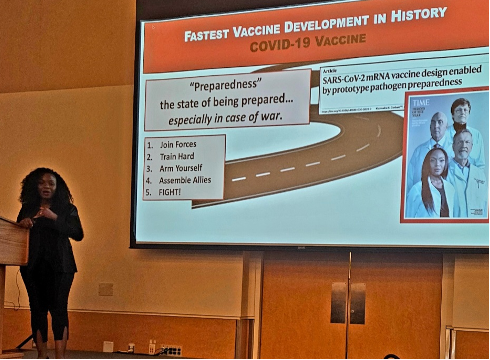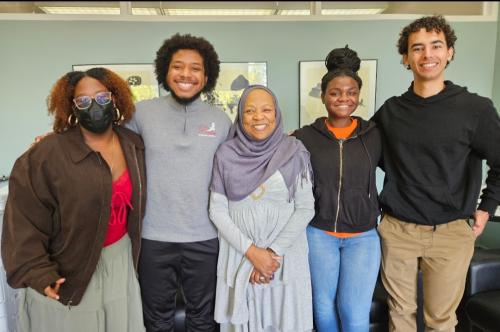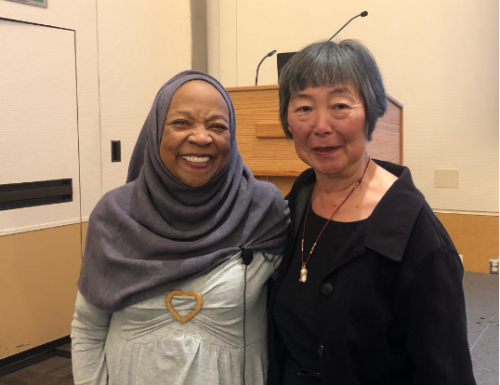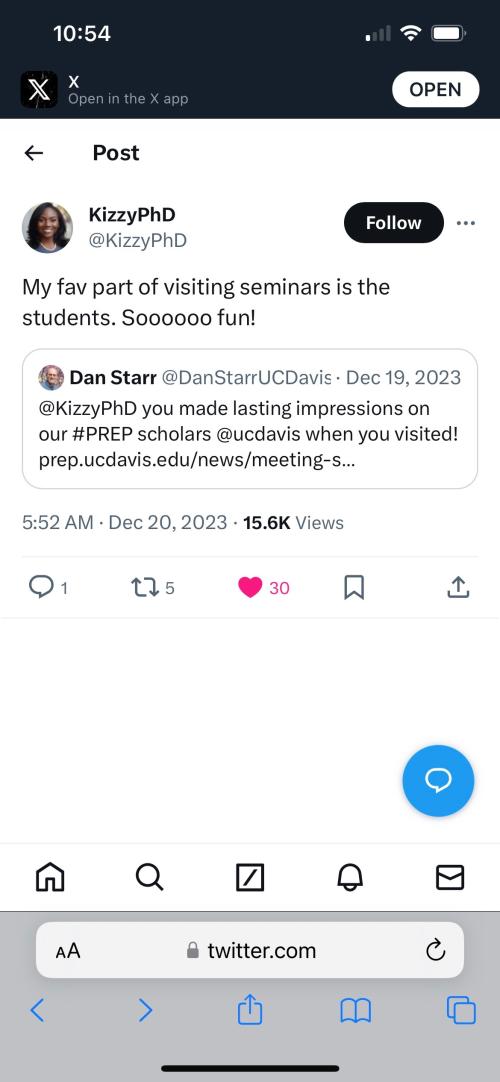
Meeting scientific pioneers
During my time as a PREP scholar at UC Davis, I have had the opportunity to meet amazing scientists who've visited Davis to give seminars. This fall, these included two speakers from the Storer Lectureship in the Life Sciences series.
I was ecstatic when I learned that Dr. Kizzmekia Corbett-Helaire, a prominent viral immunologist well known for her development of the mRNA vaccine used against SARS-CoV-2, would speak to our cohort. I had known of her because she is a North Carolina native who gave an online talk to my alma mater, North Carolina Central University, during the height of COVID. When she entered the room, we were prepared to give our routine elevator speeches. To be quite honest, I was nervous to introduce myself. But as my cohort always does, they volunteered me to give my introduction first [.....wellllll, actually, Andrew...your cohort has learned to sit on their hands because they've figured out that you'll eventually volunteer. -- Editor]. Before I was even halfway through, she screamed with excitement when I said I was also from North Carolina.
The Carolina bond indeed runs deep.
I wrapped up my introduction and when I finished, she said it was amazing. I felt uplifted to hear that from such an influential scientist. In our casual yet inspiring conversation, she gave us insights into her journey and how she persevered through obstacles.

My cohort and I subsequently attended Dr. Corbett-Helaire's Storer presentations. In the first talk, she presented a more in-depth look into her journey. In her second, she discussed the overall development of the mRNA vaccine and all of the teamwork, collaboration, and innovation that it took. She outlined a simplified step by step guide as to how her team was able to accomplish this. As Dr. Corbett-Helaire defined, preparedness is the state of being prepared, especially in case of war. The steps to fight a war (or a pandemic) are: 1. Join forces, 2. Train hard, 3. Arm yourself, 4. Assemble allies, and 5. Fight. Through this method, she was able to help combat the COVID pandemic.
Meeting such an influential figure, a black woman who grew up not too far from my hometown and who faced many obstacles, reinforces that I too can make a difference in STEM.
A week later, my PREP cohort and I met with another amazing scientist: Dr. Fatimah Jackson. Dr. Jackson, a professor of evolutionary anthropology at Howard University, focuses on characterizing the African Diaspora to properly address health disparities. As she started chatting with us, she asked each of us what we would like to do in the future: she wanted us to speak our future out loud and claim it. When she told us about her journey, I could feel the wisdom she held through all of her life experiences. She spoke on growing up in segregated schools and how she was driven by being told you can’t do something.

One question that she posed to the group has stuck with me. She asked, “Are our struggles impediments or do they stimulate our growth?” She spoke on her research on the biological consequences of the Transatlantic Slave Trade, which was a concept I never even imagined. Seeing how she combined science and history as a research topic was really eye-opening. Her story of perseverance as an african american, muslim woman in the 60s really gave me motivation to continue on this path. I owe it to the people who came before me and like Dr. Jackson said, “I am the prayer of the slave.” To wrap up our morning discussion she encouraged us to not be frightened by the future but to look at whatever comes our way and say bring it on.

I also attended Dr. Jackson's Storer Lecture. There, I had the pleasure of meeting her best friend, former Democratic Assemblywoman Mariko Yamada, whom she has known since they were kids. At this talk, Dr. Jackson spoke more about her journey. She showed how current ancestry websites are somewhat inaccurate due to not properly categorizing the effects of African migration and the impacts of slavery. She explained how you could see differences not only genetically, but also in music, food, language and culture.
Dr. Jackson said that the best way to leave a legacy is to publish. Publications are not only like money, but they allow you to have a record of your work. She continued to speak on things that motivate her, including her faith. As a muslim woman, she told us that there is a saying: there is no God but God and whatever we think God is, they are more than that. She explained that it doesn't make sense to be inhibited by another person when God gave you a right to be who you are. Finally, she left us with another lasting message: “If you make mistakes, you’re alive and as long as you’re alive, there is a chance to correct your mistakes.”
Meeting these incredible women was truly an amazing experience. I was impressed not only by their knowledge, but also by how much they cared to be a positive influence to the next generation of scientists. Speaking with them, it felt genuine that they wanted each of us to succeed. Furthermore, they encouraged us to stay in contact with each of them and informed us that their emails are always open. This legitimate regard for each of us is not something you see from every scientist. But meeting these two individuals, two black women who have had many struggles within their lives, has shown me that you don’t have to lose your true kindness to become a revolutionary scientist. Even though things get hard on your journey, you still should be willing to help pay it forward to others because no one makes it on their own. We all have hardships, but through the help of our community, we all can overcome these obstacles. And just like Dr. Jackson said, “Go through the fire to forge steel.”
postscript, 20 December. Dan Starr got this in response to a tweet about this post. We hope that some of the 15.6K viewers checked out Andrew's blog! -- Ed.
